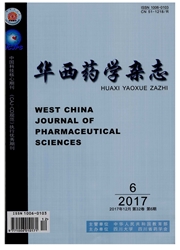

 中文摘要:
中文摘要:
目的研究不同部位木瓜提取物在细胞水平上的抗炎作用及机制。方法依次用乙酸乙酯、正丁醇萃取已用65%乙醇抽提的木瓜粉末,得到乙酸乙酯、正丁醇及水溶性部位提取物;建立THP-1及L929细胞炎症模型,用MTT法检测3个部位提取物的抗炎活性。利用核转录因子(NF-κB)报告基因系统检测NF-κB的活性,并用半定量PCR检测药物处理后细胞内炎症反应相关基因的表达。结果与对照组比较,用乙酸乙酯部位处理后的THP-1细胞内Toll样受体及其下游炎症因子的表达水平明显下降,且用该组上清液处理后的L929细胞的活细胞数明显高于其他组。结论木瓜的乙酸乙酯部位提取物具较好的抗炎效果。
 英文摘要:
英文摘要:
OBJECTIVE To study the anti-inflammation activity of the different extracted parts of Chaenomeles speciosa. METHOD65% ethanol extract of C. speciose was extracted by ethyl acetate and n-butanol sequential,then two parts of extracts and the rest of water soluble part were collected. Cell inflammation model was established by activated THP-1 and L929 cells. The anti-inflammation activity of these three extracts was detected by MTT. NF-k B reporter gene system was used to detect activity of NF-k B,and semi-quantitative RT PCR was used to detect the expression of intracellularinflammatory response related genes before and after treatment.RESULTS Compared with control group,there was a decrease inthe expression level of Toll-like receptors genes and its downstream inflammatory cytokines in ethyl acetate treated and LPS stimulated group. Moreover,viable cell number of L929 treated by its supernatant was obviously higher than other group. CONCLUSION The ethyl acetate parts of C. speciosa has an obvious anti-inflammatory effects.
 同期刊论文项目
同期刊论文项目
 同项目期刊论文
同项目期刊论文
 期刊信息
期刊信息
